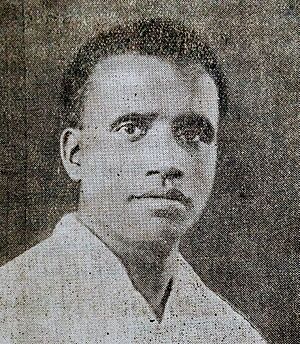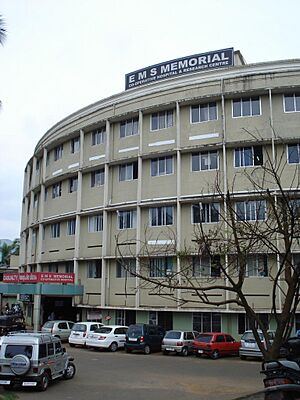E. M. S. Namboodiripad facts for kids
Quick facts for kids
E. M. S. Namboodiripad
|
|
|---|---|
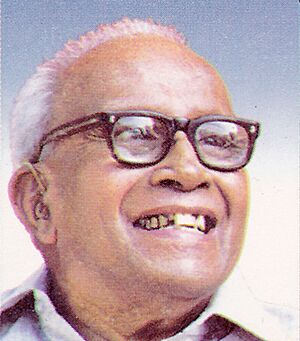 |
|
| 1st Chief Minister of Kerala | |
| In office 6 March 1967 – 1 November 1969 |
|
| Preceded by | President's rule |
| Succeeded by | C. Achutha Menon |
| In office 5 April 1957 – 31 July 1959 |
|
| Preceded by | Office Established |
| Succeeded by | Pattom Thanu Pillai |
| General Secretary of Communist Party of India | |
| In office 29 April 1962 – 11 April 1964 |
|
| Preceded by | Ajoy Ghosh |
| Succeeded by | Chandra Rajeswara Rao |
| General Secretary of Communist Party of India (Marxist) | |
| In office 8 April 1978 – 9 January 1992 |
|
| Preceded by | P. Sundarayya |
| Succeeded by | Harkishan Singh Surjeet |
| Personal details | |
| Born | 13 June 1909 Perinthalmanna, Madras Presidency, British India (Present day Malappuram district, Kerala, India) |
| Died | 19 March 1998 (aged 88) Thiruvananthapuram, Kerala, India |
| Political party | Communist Party of India (Marxist) (from 1964), Communist Party of India (before 1964), |
| Spouse | Arya Antharjanam (1937–1998) |
| Children | 4 |
| Residence | Thiruvananthapuram |
| Alma mater | St. Thomas College, Thrissur |
| Known for | Co-founder of Communist Party of India (Marxist) |
| Website | Government of Kerala |
Elamkulam Manakkal Sankaran Namboodiripad (born June 13, 1909 – died March 19, 1998) was an important Indian politician. People often called him E. M. S. He was a leader of the Communist Party.
He became the first Chief Minister of Kerala twice. First, from 1957 to 1959, and then again from 1967 to 1969. He was the first Chief Minister in India who was not from the Indian National Congress party.
In 1964, he helped create a new political party called the Communist Party of India (Marxist) (CPI(M)). As Chief Minister, EMS started big changes in land ownership and education in Kerala. These changes helped Kerala become a top state in social progress. He was a key leader of the CPI(M) for many years.
Contents
Early Life and Education
Elamkulam Manakkal Sankaran Namboodiripad was born on June 13, 1909. He was the fourth son in a well-known family in Elamkulam, Malappuram. This area is now part of the Malappuram district in Kerala. He lost his father when he was only five years old.
In 1921, during the Malabar rebellion, his family had to move because their house was attacked. In his younger days, EMS worked with others to fight against old customs and the caste system. These were common in the Namboothiri community. He joined a group of young Namboothiri people who wanted progress.
Namboodiripad went to St. Thomas College, Thrissur. During his college years, he was very involved in the Indian independence movement. He was passionate about India gaining freedom from British rule. It is said he would walk long distances to listen to famous speakers.
EMS was known for his stammer. When someone asked him if he always stammered, he would famously reply, "No, only when I speak."
Journey into Socialism
In 1934, EMS helped start the Congress Socialist Party. This was a group within the Indian National Congress that believed in socialism. Socialism is an idea where society, not private individuals, owns and controls resources. He became a joint secretary for this party.
He also edited a Malayalam newspaper called Prabhatham. This newspaper shared the ideas of the Congress Socialist Party in Kerala. During this time, he was also elected to the Madras Legislative Assembly in 1939.
EMS strongly believed in socialist ideas. He cared deeply about the working class and their rights. This led him to join the Communist movement. Communism is a political and economic system where the community owns everything. The Indian government saw him as one of the founders of the Communist Party of India (CPI) in Kerala. Because of this, he sometimes had to go into hiding.
In 1964, the CPI party split into two. EMS chose to join the new party, the Communist Party of India (Marxist) (CPI(M)). He became a very important leader in the CPI(M). He was a member of its top committees until he passed away in 1998. From 1977 to 1992, he served as the party's general secretary. He was a scholar of Marxism, which is the philosophy behind communism. His ideas greatly shaped the development of Kerala.
Becoming Chief Minister of Kerala
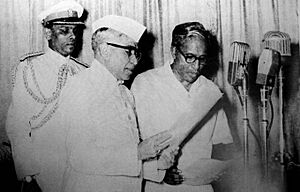
In 1957, the first elections for the new Kerala Legislative Assembly were held. A government led by the Communist Party of India (CPI) won. This made E. M. S. Namboodiripad the first communist leader in India to lead a government chosen by the people. He became the first Chief Minister of Kerala on April 5, 1957.
His government introduced important new laws. These included the Land Reform Ordinance and the Education Bill. The land reform aimed to give land to farmers who worked on it. The education bill sought to improve schools and teachers' conditions.
However, these new laws led to protests in 1958. This period was known as the Vimochana Samaram (Liberation Struggle). In 1959, the central government of India stepped in. They used a special power called Article 356 of the Indian Constitution. This allowed them to suspend the state government and take control. This is called President's rule.
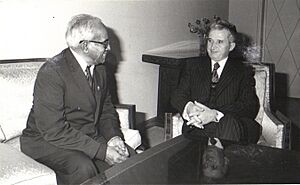
Namboodiripad became the Chief Minister of Kerala for the second time in 1967. This time, he led a group of seven parties. His second term lasted for about two and a half years. The government ended on October 24, 1969. This happened because of disagreements among the parties in his coalition.
EMS also served as the Leader of Opposition in the Kerala Legislative Assembly. He held this role from 1960 to 1964 and again from 1970 to 1977. He had a strong vision for giving more power and resources to local communities. This idea was called the "People's Plan." He also supported the Kerala Literacy Movement, which helped many people learn to read and write. He wrote many books in both English and Malayalam.
Sino-Indian War and Party Split
In 1962, there was a war between India and China. Other political parties tried to say that left-wing parties were on China's side. EMS Namboodiripad said that his party wanted to solve the border problem through peaceful talks.
Involvement in Arts and Literature
Namboodiripad was also involved in the "JeevalSahitya Prastanam." This was later renamed the Purogamana Sahitya Prastanam, meaning "Progressive Association for Arts and Letters." This group aimed to promote progressive ideas through literature and art.
He worked with other important thinkers and writers in Kerala. Even though there were some disagreements, EMS recognized the importance of this movement. This debate helped shape modern Malayalam literature.
Death
Even when he was old and not well, Namboodiripad stayed active in politics. He campaigned during the 1998 general election. Soon after the election results, he got pneumonia. He was admitted to a hospital in Thiruvananthapuram.
He passed away on March 19, 1998, at the age of 88. This was just hours after he had written two articles for a newspaper. The state government announced seven days of mourning. His body was covered with the CPI(M) flag. Many people, including leaders and common citizens, came to pay their respects.
He was cremated with full state honors in Thiruvananthapuram. The President of India, K. R. Narayanan, and Prime Minister Atal Bihari Vajpayee both expressed their sadness. They remembered him as a scholar, leader, and champion of the working classes.
Sadly, three more deaths happened in his family within five years after he passed away.
Family
EMS was married to Arya Antharjanam. They had two sons, E. M. Sreedharan and E. M. Sasi. They also had two daughters, E. M. Malathy and E. M. Radha. His grandson, Sujith Shankar, is an actor.
Writing
EMS was a talented writer. He wrote many books and articles. His book about the history of Kerala is especially well-known.
See also
- Kerala Council of Ministers
 | Jackie Robinson |
 | Jack Johnson |
 | Althea Gibson |
 | Arthur Ashe |
 | Muhammad Ali |


